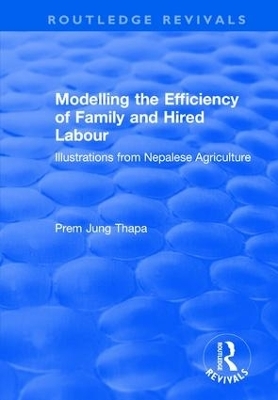
Modelling the Efficiency of Family and Hired Labour
Routledge (Verlag)
978-1-138-71218-8 (ISBN)
Prem Jung Thapa, Dr, Research School of Social Sciences, The Australian National University, Canberra, Australia.
Contents: Introduction: Motivation; The research question; Estimation methodology; The setting; Chapter outline. Background and Literature Review: Background issues; Literature review; Summary. A Farm Household Model with Heterogeneous Labour Inputs: Introduction; Analytical structure of a model with heterogeneous labour; Aggregating labour inputs and production function separability; A farm household model with heterogeneous composite labour; Labour supply implications of heterogeneity; Summary. Estimation Strategy: General issues; The two step estimation strategy for a non-recursive model; A two step estimation strategy with heterogeneous labour; Error correction for the two step estimator; Summary. The Setting and The Data: The setting; The data set; Main variable definitions; Summary. Production Function Estimation Results and Tests for Labour Heterogeneity: Introduction; Data summary; Estimation and inference for farms using both family and hired labour; Testing for alternative aggregates of family and hired labour; Complete results for the linear composite labour model; Sensitivity analysis; Elasticities of substitution with a linear labour composite; Summary; Appendix 6: The translog specification with family and hired labour as independent inputs. Labour Supply Estimation Results: Introduction and motivation; Labour supply implications of linear heterogeneity; Data summary; Model specification and identification; Labour supply regression results: male family members; Labour supply regression results: female family members; Summary; Appendix 7: Complete labour supply regression results for selected model specifications. Summary and Conclusions: Overview; Summary of analytical results; Some implications; Suggestions for further research; Bibliography; Index.
| Erscheinungsdatum | 18.10.2019 |
|---|---|
| Reihe/Serie | Routledge Revivals |
| Verlagsort | London |
| Sprache | englisch |
| Maße | 152 x 229 mm |
| Gewicht | 453 g |
| Themenwelt | Geschichte ► Teilgebiete der Geschichte ► Wirtschaftsgeschichte |
| Wirtschaft ► Volkswirtschaftslehre ► Makroökonomie | |
| Weitere Fachgebiete ► Land- / Forstwirtschaft / Fischerei | |
| ISBN-10 | 1-138-71218-3 / 1138712183 |
| ISBN-13 | 978-1-138-71218-8 / 9781138712188 |
| Zustand | Neuware |
| Haben Sie eine Frage zum Produkt? |
aus dem Bereich


